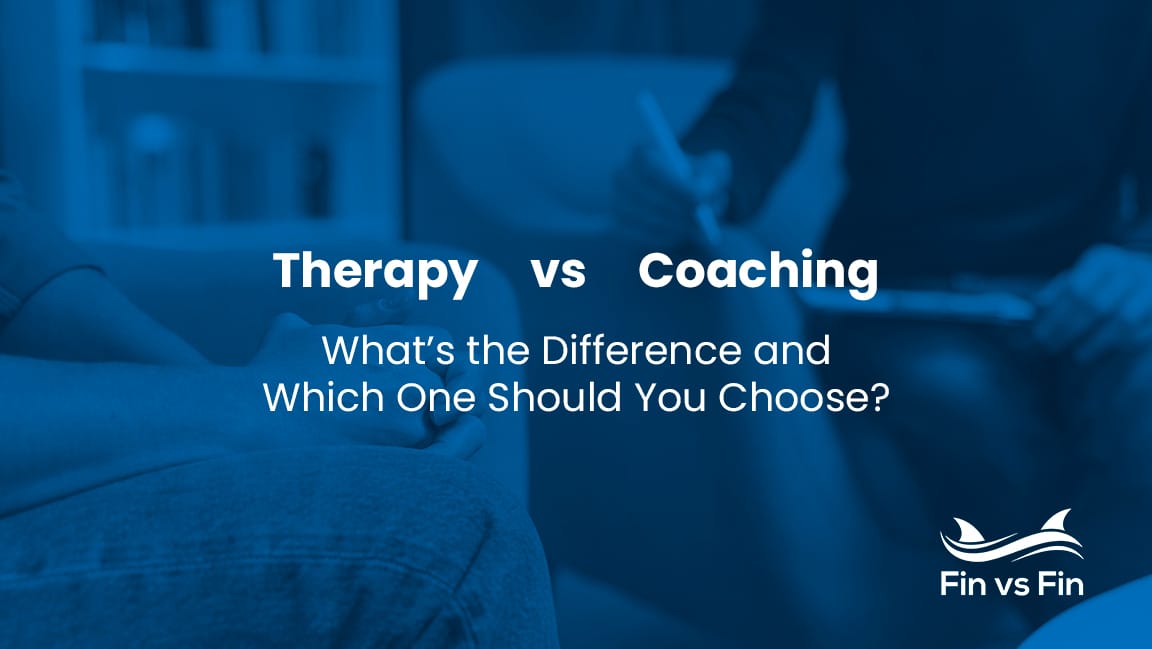Key Takeaways:
- Therapists have advanced degrees and formal licensing; coaches may have varied backgrounds and certifications.
- Therapy focuses on mental health, while coaching focuses on personal development and goal achievement.
- A therapist is able to diagnose mental health conditions, while a coach can not make a formal diagnosis.
- Therapists have strict confidentiality regulations, while coaching confidentiality regulations can vary.
- Therapy may be covered by insurance; coaching usually is not.
- Coaching may offer more flexible scheduling options for appointments compared to therapy.
Coaching and therapy are two distinct approaches to personal development, well-being, and growth. Therapists are mental health professionals who diagnose and treat mental health conditions, while coaches empower individuals to focus on and reach certain personal or professional goals.
Coaching emphasizes skill development, self-improvement, and positive change, making it an ideal choice for those seeking to maximize their potential and reach their goals. Therapy is dedicated to addressing mental health conditions, emotional difficulties, and relational concerns.
In this article, we discuss the differences and benefits of both coaching and therapy, so you can make an informed decision that best suits your unique needs and goals.
What Is the Difference Between a Therapist and a Coach?

Therapists primarily address mental health and emotional well-being through clinical diagnoses and evidenced-based treatment, while coaches typically focus on personal development, goal achievement, and self-improvement.
Therapists are trained to diagnose and treat mental health conditions and emotional concerns. They work with clients who may be dealing with conditions such as depression, anxiety, trauma, and relationship problems. Therapists use evidence-based techniques, such as cognitive behavioral therapy (CBT), to help clients address and manage these conditions or concerns.
Coaches work with clients on goal achievement, personal development, and skill enhancement. Their primary focus is to help clients set and attain specific objectives in areas such as career, relationships, and personal growth. They assist clients in clarifying their aspirations and developing strategies to reach them. The coaching process is typically forward-looking and action-focused. They may help clients build confidence, enhance communication skills, and make healthier life choices.
Both therapists and coaches hold clients accountable for their actions and provide support, however, coaches do not diagnose or treat mental health conditions and cannot provide clinical counseling.
Therapists and coaches also differ in terms of their training, education, approach, scope of practice, credentials, client confidentiality regulations, fees, salary, and appointment availability.
Related reading: Klarity Anxiety Review- Pros, Cons, Alternatives, & More
Training and Education
Therapists, such as psychologists, social workers, and counselors, typically have advanced degrees (e.g., Master’s or Doctoral) in fields like psychology, counseling, or social work. They undergo extensive training in various therapeutic techniques and are licensed to practice by their respective state.
Coaches, such as life coaches or health and wellness coaches, may have a variety of educational backgrounds, but they generally do not require the same level of formal education as therapists. Some coaches complete certification programs, which can vary in length and intensity. Keep in mind that coaching does not require any certification, meaning anyone is able to refer to themselves as a coach.
Both coaches and therapists may go through additional training to become specialized in certain areas. Therapists may specialize in trauma, mindfulness, fertility, and more. Likewise, coaches may offer specialized coaching related to specific concerns, such as nutrition, fitness, weight management, and more.
Approach
Therapists provide a safe and confidential space for clients to explore their thoughts and emotions. They may use various therapeutic approaches, such as cognitive-behavioral therapy (CBT), psychoanalytic therapy, or dialectical behavior therapy (DBT), to address specific mental health concerns. They may also take an eclectic approach, using techniques from several evidence-based therapeutic modalities, to create a more personalized treatment approach.
Coaches, like health and wellness coaches or life coaches, typically use a client-centered approach, focusing on setting and achieving goals. They may use techniques like motivational interviewing, goal setting, and action planning to help clients make sustainable lifestyle changes.
Scope of Practice
Therapists primarily work with individuals who have diagnosed mental health conditions or who are experiencing emotional difficulties. They may also work with couples, families, or groups. Their practice is regulated by licensing boards and professional organizations.
The scope of practice for a coach is centered on personal and professional development and achieving goals, rather than clinical or therapeutic treatment. For example, a health and wellness coach may work with individuals who want to improve their overall health and well-being, including those who want to adopt healthier habits, manage stress, or enhance their quality of life.
It’s important to note that coaching does not involve diagnosing or treating mental health conditions. When clients present with psychological conditions or emotional concerns, coaches should refer them to a mental health professional, such as a therapist or counselor.
Credentials/Licenses
The primary difference in credentials between coaches and therapists lies in their educational background and the requirements for licensure. Coaches may hold coaching certifications from recognized coaching organizations and complete coaching training hours, while therapists hold advanced degrees, obtain professional licenses, and engage in supervised clinical experience.
Licenses for therapists may include, licensed psychologist, licensed professional counselor, licensed marriage and family therapist, and licensed clinical social worker. Therapists will hold a masters degree and may also have one or more doctoral degrees. In addition, therapists may also be certified in specific therapeutic approaches, such as trauma-focused CBT, eye movement desensitization and reprocessing (EMDR), and more. Therapists are overseen by various boards, such as the Board of Behavioral Sciences and the Board of Psychology.
Coaching credentials can vary based on the type of coaching and the organization or certification body that oversees the coaching profession. Different coaching specialties and niches may have their own unique certification programs. Examples include:
- The International Coach Federation (ICF), one of the most widely recognized coaching organizations that offers various levels of coaching certifications
- Center for Credentialing & Education (CCE), which offers the Board Certified Coach (BCC) credential for those who meet all the necessary requirements
- Certified Life Coach (CLC) Institute, a certified ICF school that offers online life coach certifications
In addition, there are numerous specialized coaching certifications, such as executive coaching, leadership coaching, career coaching, health and wellness coaching, and more. These certifications often align with specific coaching niches and require additional training and expertise in those areas.
Keep in mind that the coaching profession is not as regulated as some other professions, so the quality and credibility of coaching certifications can vary.
Client Confidentiality
Both therapists and coaches are committed to safeguarding client confidentiality, but the legal and ethical frameworks governing confidentiality are more established and rigorous in therapy. Clients working with therapists can generally expect a higher level of legal protection for their personal information, as therapists deal with more sensitive and potentially life-threatening issues. Clients working with coaches should still expect their information to be treated with respect, but they may not have the same legal and professional safeguards as those working with therapists.
Therapists are bound by strict legal and ethical obligations to maintain client confidentiality. Laws and regulations, such as the Health Insurance Portability and Accountability Act (HIPAA) in the United States, govern the privacy and security of mental health records. Professional organizations for therapists have established detailed codes of ethics that require therapists to protect the confidentiality of their clients. Breaching confidentiality can lead to professional consequences.
While therapists are committed to confidentiality, there are exceptions to this rule. For example, they are obligated to break confidentiality if they believe a client poses a risk to themselves or others.
The regulation of client confidentiality in coaching is less standardized. It can vary depending on the coach’s credentials, training, and the specific organization or program they are associated with. Some coaching organizations, like the International Coach Federation (ICF), have ethical guidelines that address confidentiality. These guidelines emphasize the importance of respecting client privacy.
Coaches typically do not deal with the same level of sensitive personal information as therapists. While they may discuss personal health goals and lifestyle choices, they do not typically delve deeply into mental health or treatment for psychological conditions. Similar to therapists, coaches may need to break confidentiality in situations where a client’s safety or well-being is at risk.
Insurance Coverage
Insurance coverage for therapy and coaching differs significantly due to the nature of the services provided, professional qualifications, and how insurance companies categorize these services.
Mental health treatment, including services provided by licensed psychologists, social workers, and counselors, is often covered by health insurance plans. Many insurance plans include mental health services as part of their coverage, and laws like the Mental Health Parity and Addiction Equity Act (MHPAEA) in the United States require insurance companies to offer comparable coverage for mental and physical health services.
Insurance companies typically reimburse clients for therapy services provided by licensed professionals, and clients may only be responsible for copayments or deductibles. In many cases, insurance coverage for therapy requires a mental health diagnosis, and services must be deemed medically necessary by the insurance company. Insurance plans may have limits on the number of therapy sessions covered per year and may require preauthorization for extended treatment. These limits can vary based on the specific insurance plan.
Coaching is generally not as widely covered by health insurance plans. It is often considered a non-medical, lifestyle-focused service rather than a treatment for a diagnosed condition. Clients seeking coaching services typically need to pay for these services out of pocket. They are usually not covered by health insurance, and clients are responsible for the full cost. Coaching does not require a diagnosis, and clients do not need to demonstrate medical necessity to access these services.
It’s important to note that insurance coverage for therapy and coaching may vary based on the specific insurance plan, location, and the qualifications of the provider. In some cases, clients may have access to Employee Assistance Programs (EAPs) that offer a limited number of coaching sessions as part of their benefits.
When seeking therapy or health and wellness coaching services, it’s advisable to contact your insurance provider to understand what is covered and to clarify any potential out-of-pocket costs. Additionally, you can discuss payment options and fee structures with the professional you plan to work with to make informed decisions about your healthcare services.
Life Coach vs. Therapist Salary and Fees
Therapists and coaches can have differences in their salary structures and client fees due to various factors, including their education, experience, credentials, and the nature of the services they provide.
Therapists typically undergo extensive education and training, often including graduate or doctoral degrees. This higher level of education and training can lead to higher earning potential. Therapists who specialize in particular areas may charge higher fees for their specialized services.
Many therapists accept health insurance, which allows clients to pay lower out-of-pocket fees. Insurance reimbursement rates can vary widely depending on the therapist’s location, specialty, and the insurance plan. Some therapists offer sliding scale fees, which means they adjust their fees based on a client’s ability to pay. This makes therapy more accessible to a wider range of clients. Therapists in private practice typically have more control over setting their fees, while those working for agencies or organizations may have more standardized or lower salaries.
Coaches often have a range of educational backgrounds and training, which can impact their fees. Coaches with specialized certifications, additional training, or expertise in particular areas may be able to charge higher fees. For example, coaches specializing in health and wellness or chronic disease management might command higher rates.
Many coaches work independently and set their own fees, allowing for greater flexibility in determining how much to charge clients. Coaching is typically not covered by health insurance, so clients are responsible for paying the full cost of coaching services out of pocket.
Fees for coaching can vary widely, ranging from relatively affordable rates to higher fees depending on the coach’s experience, location, and the demand for their services.
Coaches often offer packages or programs that include multiple sessions or longer-term commitments. These packages may have a different fee structure than individual sessions.
Some coaches offer sliding scale fees, making their services more accessible to a wider range of clients. Group coaching sessions may also be available at lower rates.
Availability
Appointment availability for therapists and coaches can vary based on several factors, including their individual practices, the demand for their services, and their chosen scheduling options.
Many therapists, especially those in private practice or working in clinical settings, offer appointments during regular business hours. This typically includes daytime and early evening appointments Monday to Friday. Some therapists may offer appointments on weekends, but it’s less common.
Therapy sessions typically last 45 to 50 minutes, although some therapists offer extended sessions or shorter check-in sessions as needed. Therapists also offer crisis intervention services or have protocols for addressing urgent situations outside of regular hours.
The availability of teletherapy has expanded, making it possible for clients to access therapy from the comfort of their own homes and potentially providing more flexibility in appointment scheduling.
Related reading: Cerebral vs. Talkspace- Which Online Therapy Platform Is Better?
Coaches often have more flexibility in their scheduling. They may offer appointments during a wider range of hours, including evenings and weekends, to accommodate clients’ diverse schedules.
Coaching sessions can vary in length, depending on the coach’s approach and the client’s needs. Sessions may range from 30 minutes to an hour or longer. Coaching often involves short-term engagements aimed at helping clients set and achieve specific goals. This can result in shorter durations of coaching compared to therapy, which may be ongoing or long-term.
Many health and wellness coaches offer remote coaching sessions, which can be conducted via phone, video conferencing, or email. This can enhance flexibility in scheduling and make it easier for clients to access coaching from anywhere. Coaches may be more accessible for quick questions or support between scheduled sessions, fostering a more active and ongoing coaching relationship.
What Are the Benefits of Coaching and Therapy?
Both coaching and therapy offer a range of benefits for individuals seeking support and personal development.
Benefits of coaching:
- Goal achievement: Coaching is primarily goal-oriented. Coaches help clients set and achieve specific personal or professional goals, whether related to career, relationships, health, or personal development.
- Accountability: Coaches provide structure and hold clients accountable for their actions and progress toward their goals. This can motivate individuals to take action and stay on track.
- Skill development: Coaches can assist clients in developing specific skills, such as communication, leadership, time management, or stress management, to improve their personal and professional lives.
- Confidence building: Through coaching, clients often gain greater self-confidence and self-esteem. Coaches provide support and encouragement to help clients recognize and build on their strengths.
- Wellness and health improvement: Health and wellness coaches focus on helping individuals make positive lifestyle changes, such as improving nutrition, fitness, and stress management. This can lead to better physical and mental health.
- Career advancement: Career coaches can help individuals navigate career transitions, find job satisfaction, and develop strategies for professional growth.
- Personal fulfillment: Coaching can help clients clarify their values and life purpose, leading to a greater sense of fulfillment and satisfaction in life.
Benefits of therapy:
- Mental health support: Therapy is specifically designed to address mental health concerns and emotional difficulties. Therapists can help individuals cope with conditions like depression, anxiety, PTSD, and more.
- Diagnosis and treatment: Therapists can provide clinical diagnoses and evidence-based treatment for mental health conditions. They offer therapeutic interventions to help clients manage psychological and relational concerns.
- Emotional regulation: Therapy helps individuals develop emotional regulation and coping skills, allowing them to better manage stress, trauma, and difficult life circumstances.
- Enhanced self-understanding: Therapy facilitates self-exploration and self-awareness. Clients gain a deeper understanding of their thoughts, emotions, and behaviors, which can lead to personal growth and improved relationships.
- Relationship improvement: Couples or family therapy can help improve relationships and communication among family members or couples. This is particularly beneficial for resolving conflicts and enhancing intimacy.
- Trauma healing: Therapists are trained to help clients process and heal from traumatic experiences, including childhood trauma.
Can a Therapist Be a Life Coach?
Yes, a therapist can become a life coach, and some professionals choose to have dual roles as both therapists and life coaches.
If a therapist decides to offer life coaching services, they must clearly define the scope of their services and maintain ethical boundaries. It’s essential to avoid practicing therapy under the guise of coaching or offering therapy to clients seeking coaching services. Clients should be fully informed about the qualifications, credentials, and services offered by a therapist who is also providing coaching. They should understand the limitations of coaching compared to therapy.
If a therapist is offering both therapy and coaching services, they should have clear distinctions in their business practices and insurance coverage. Insurance typically covers therapy but not life coaching.
Is Coaching as Effective as Therapy?
The effectiveness of coaching and therapy depends on an individual’s specific needs, goals, and the nature of the concerns they are facing. Both coaching and therapy have their own unique strengths and are designed to address different aspects of personal development and well-being.
Coaching is highly effective for individuals who have specific goals they want to achieve, whether in their personal or professional lives. Coaches help clients clarify objectives and develop strategies to help their clients reach them. Coaching can be effective for individuals going through life transitions, such as career changes, retirement, or personal development phases.
Therapy may be more effective for individuals dealing with mental health conditions, relationship concerns, or emotional difficulties. Therapists are trained to provide diagnoses and treatment for conditions like depression, anxiety, PTSD, and more. Therapy helps individuals process and heal from trauma, past experiences, and emotional wounds. It can improve emotional regulation, coping skills, and overall mental well-being.
Coaching and Therapy Together
Combining coaching and therapy can be a beneficial approach for some individuals, as it allows them to access the strengths of both modalities.
Combining coaching and therapy offers a holistic approach to personal development and well-being. While therapy addresses mental health concerns and emotional difficulties, coaching focuses on goal achievement and skill development. This integration allows individuals to engage in comprehensive self-exploration, examining not only their emotional well-being, but also their personal and professional aspirations.
It may potentially add an extra layer of accountability and motivation to the therapeutic process, making it particularly beneficial for individuals going through major life transitions, such as career changes or relationship shifts. The combination may be valuable for those working on long-term personal development, addressing underlying mental health concerns through therapy, while moving towards a more fulfilling and balanced life with coaching. This approach may enhance self-awareness and work well for individuals dealing with complex, multifaceted concerns.
It’s important to note that the effectiveness of combining coaching and therapy may depend on the qualifications and experience of the professionals involved and how well they can collaborate to ensure a cohesive and beneficial treatment plan.
Summary
Coaches and therapists serve distinct roles in supporting individuals’ well-being and personal development. Coaches primarily focus on goal achievement, personal growth, and skill development, helping clients set and reach specific objectives in various life areas, while therapists concentrate on addressing mental health and emotional concerns, offering clinical diagnoses and treatment for conditions like depression and anxiety. Coaches motivate action and hold clients accountable, while therapists facilitate emotional healing, self-understanding, and coping strategies. Coaches guide clients toward a future-oriented perspective, while therapists delve into past experiences and emotional exploration.
In terms of credentials, therapists possess advanced degrees and licenses, while coaching qualifications vary.
Ultimately, the choice between coaching and therapy, or a combination of both, depends on an individual’s specific needs, goals, and circumstances. It’s important to seek the support that aligns with your unique situation and objectives.
Frequently Asked Questions (FAQs)
When should a coach refer to a therapist?
Coaches should refer clients to a therapist when they recognize or suspect that the client is dealing with emotional or mental health concerns that go beyond the scope of life coaching.
Is a life coach the same as a psychologist?
No, a life coach and psychologist have different levels of training, credentials, and areas of focus. A life coach may or may not go through a certification program, however, a psychologist must meet certain educational standards, such as obtaining a doctoral degree, pass two board exams, and more.
Can a life coach diagnose mental health conditions?
No, a life coach is not qualified to diagnose any mental health conditions.
Methodology
We conduct extensive research to evaluate the pricing, effectiveness, accessibility, overall quality, and user experience of each product we review. This also included examining and comparing them to several alternatives.
| Review Process | Key Metrics | Weighting |
|---|---|---|
| Purchase online | – ease to complete intake form – affordability – upfront commitment or subscription required? – money back guarantee or refund policy? | 1 |
| Shipping + unboxing | – shipping cost – time from order to treatment delivery – sustainable packaging | 1 |
| Testing + journal for 1-3 months | – ease of use – transition into habitual use – taste / smell / feel / pain | 1.5 |
| Results after 3 months of use | – efficacy / results – ease of forming a health habit – requires additional purchae? – responsive customer support – willingness to recommend to a friend | 1.5 |
Related Reading

Average Health Coach Salary: Insights for Those Wondering If This Career Is Worth It
With an average yearly salary of $55,672 in the U.S., health coaching is a worthwhile career for those interested in the health and wellness space who want to focus on supporting others. Health coaches in Delaware, Alaska, and Washington DC, as well as in major

What to Expect From a Life Coach and How to Get the Most Out of Your Coaching Experience
Life coaching has emerged as a strategy for overcoming personal and professional challenges. Distinct from therapists and counselors, life coaches focus on helping their clients identify their strengths and meet future goals. While life coaches don’t have to undergo regulated training, like therapists, various life

Topics to Be Coached On: Discovering What People Want From Coaching
People seek out the services of coaches for a multitude of reasons. Individuals may seek out coaches to assist them in working towards specific or broader goals, whether they pertain to career advancement, personal development, health and well-being, or other life domains. Depending on an

PlushCare Anxiety Review: Is It Best for Online Therapy & Anxiety Meds?
Telehealth platforms, like PlushCare, allow you to prioritize your mental health in a more convenient and affordable way. With PlushCare’s online platform, you won’t have to rearrange your schedule, worry about transportation, or leave home to connect with a therapist or doctor, even if

Klarity Anxiety Review – Pros, Cons, Alternatives, & More
Affecting over 40 million American adults each year, anxiety is one of the most common mental health conditions. Regardless of the type of anxiety condition, they are all highly treatable, with many individuals experiencing symptom reduction or relief with appropriate treatment. Finding treatment, booking

Circle Medical ADHD Review – Is It Legit For ADHD Meds Online?
ADHD can interfere with your quality of life and disrupt your work schedule. We know how busy life can get, and sometimes, it may feel impossible to make the time to see an in-person care provider. Plus, the steps to find appropriate support may feel














